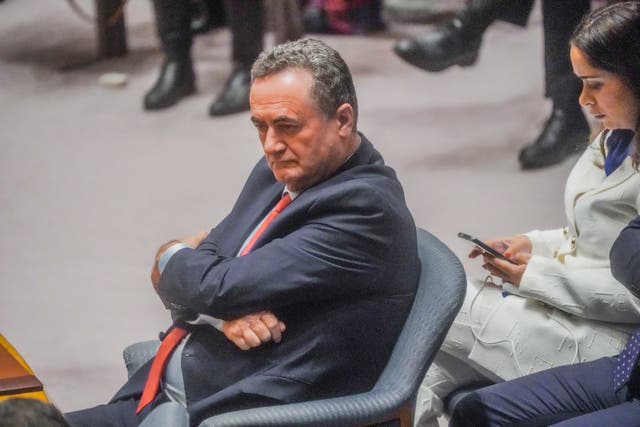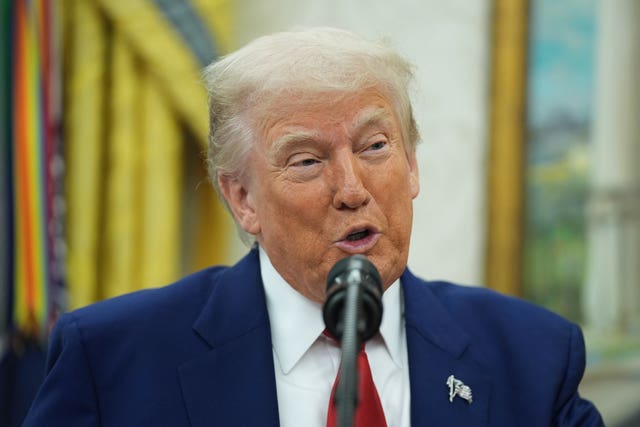Israel says it will establish 22 new Jewish settlements in occupied West Bank
Most of the international community views settlements as illegal and an obstacle to resolving the decades-old conflict.

Israel has said it would establish 22 new Jewish settlements in the occupied West Bank.
They would include new settlements and the legalisation of outposts already built without government authorisation.
Israeli strikes on the Gaza Strip, meanwhile, killed 13 people overnight, health officials said.
Israel captured the West Bank in the 1967 Mideast war and the Palestinians want it to be the main part of their future state.
Most of the international community views settlements as illegal and an obstacle to resolving the decades-old conflict.
Israel’s defence minister Israel Katz said the settlement decision “strengthens our hold on Judea and Samaria”, using the biblical term for the West Bank, “anchors our historical right in the Land of Israel, and constitutes a crushing response to Palestinian terrorism”.

He added it was also “a strategic move that prevents the establishment of a Palestinian state that would endanger Israel”.
Israel has already built well over 100 settlements across the territory that are home to some 500,000 settlers. The settlements range from small hilltop outposts to fully developed communities with blocks of flats, shopping centres, factories and public parks.
The West Bank is home to three million Palestinians, who live under Israeli military rule with the Western-backed Palestinian Authority administering population centres. The settlers have Israeli citizenship.
Israel has accelerated settlement construction in recent years – long before Hamas’s October 7 2023 attack ignited the war in Gaza – confining Palestinians to smaller and smaller areas of the West Bank and making the prospect of establishing a viable, independent state even more remote.
During his first term, US President Donald Trump’s administration broke with decades of US foreign policy by supporting Israel’s claims to territory seized by force and taking steps to legitimise the settlements. Former president Joe Biden, like most of his predecessors, opposed the settlements but applied little pressure to Israel to curb their growth.

The top United Nations court ruled last year that Israel’s presence in the occupied Palestinian territories is unlawful and called on it to end, and for settlement construction to stop immediately. Israel denounced the non-binding opinion by a 15-judge panel of the International Court of Justice, saying the territories are part of the historic homeland of the Jewish people.
Israel withdrew its settlements from the Gaza Strip in 2005, but leading figures in the current government have called for them to be re-established and for much of the Palestinian population of the territory to be resettled elsewhere through what they describe as voluntary emigration.
Palestinians view such plans as a blueprint for their forcible expulsion from their homeland, and experts say the plans would likely violate international law.
Israel now controls more than 70% of Gaza, according to Yaakov Garb, a professor of environmental studies at Ben Gurion University, who has examined Israeli-Palestinian land use patterns for decades.
The area includes buffer zones along the border with Israel as well as the southern city of Rafah, which is now mostly uninhabited, and other large areas that Israel has ordered to be evacuated.
The war began with Hamas’s October 7 attack, in which militants stormed into Israel, killing some 1,200 people, mostly civilians, and abducting 251. Hamas still holds 58 hostages, around a third of them alive, after most of the rest were released in ceasefire agreements. Israeli forces have rescued eight and recovered dozens of bodies.
Israel’s retaliatory offensive has killed more than 54,000 Palestinians, mostly women and children, according to Gaza’s Health Ministry, which does not say how many of the dead were civilians or combatants.
Israeli strikes killed at least 13 Palestinians overnight in Gaza, according to local hospitals.
Four were killed in a strike on a car in Gaza City late on Wednesday and another eight, including two women and three children, were killed in a strike on a home in Jabaliya. A strike on a built-up refugee camp in central Gaza killed one person and wounded 18.
There was no immediate comment from the Israeli military, which says it only targets militants and blames civilian deaths on Hamas because the militants are embedded in populated areas.





